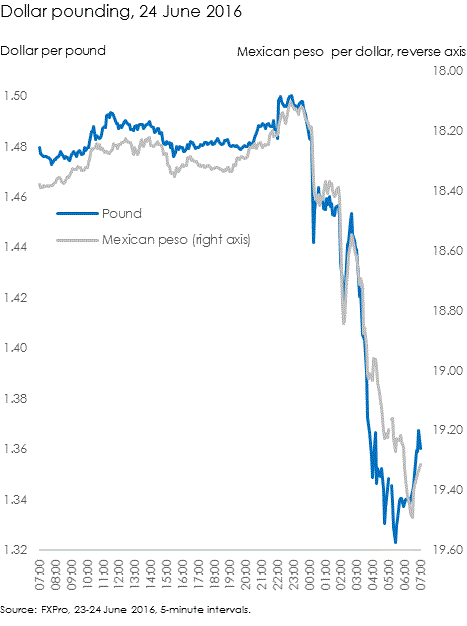Brexit and the dollar
26 June 2016
During the E.U. referendum election night when the voting area of Sunderland in the North East of England announced its voting results at 00:16 hours on 24 June, the pound started a mindboggling fall against the dollar. Sunderland was seen as a bellwether voting district and only the 4th out of 382 to declare. The predicted Leave district produced a 23 point lead over Remain. A 7-point lead was considered to predict a Leave win. The pound depreciated against the dollar between 00:10h and 05:30h by about 10 percent from USD1.4985 per pound prior to the announcement to USD1.3297 before stabilising and recovering somewhat. This was one of the biggest intra-day moves in the pound’s modern history (Chart).
The precipitous decline of the pound serves as a reminder that the international monetary system does not work as intended. The rapid rush into the dollar can only occur due to the dominant role of the dollar as a safe haven currency. Here lies the fundamental dilemma of the system. The dependence on one currency necessarily provokes possible imbalances and turbulences with others. While Brexit offers many good reasons for shedding the pound it offers per se very few if any of holding the dollar.
The pound was not alone. Other currencies weakened against the dollar too. The Mexican peso, for example lost about 6 percent during the same time period. The depreciation of the Mexican peso can be attributed solely to contagion and rush for safety. It shows that too much money is funnelled towards the dollar in times of distress causing considerable collateral damage if sustained to unrelated parties.
The episode illustrates the asymmetric distribution of currency holding choices. It also highlights that in times of extreme distress there is simply not sufficient liquidity to allow for an orderly accommodation of a sudden surge in demand for dollar liquidity. The reliance on the dollar to absorb sudden sentiment shocks is highly destabilising and not consistent with a stable international economy.
The international dimension and contagion of Brexit should serve to bring forward needed reforms of the international monetary system. This could either be increasing promotion of an international standard like the IMF’s SDR, a broader network of central bank swaps and/or the proliferation of international currencies to establish a greater number of international liquidity hubs. Brexit will undoubtedly lead to soul-searching of what went wrong with the U.K. and the E.U.; it should also serve to highlight the deficiencies of international liquidity distribution and the functioning of the international monetary system.
